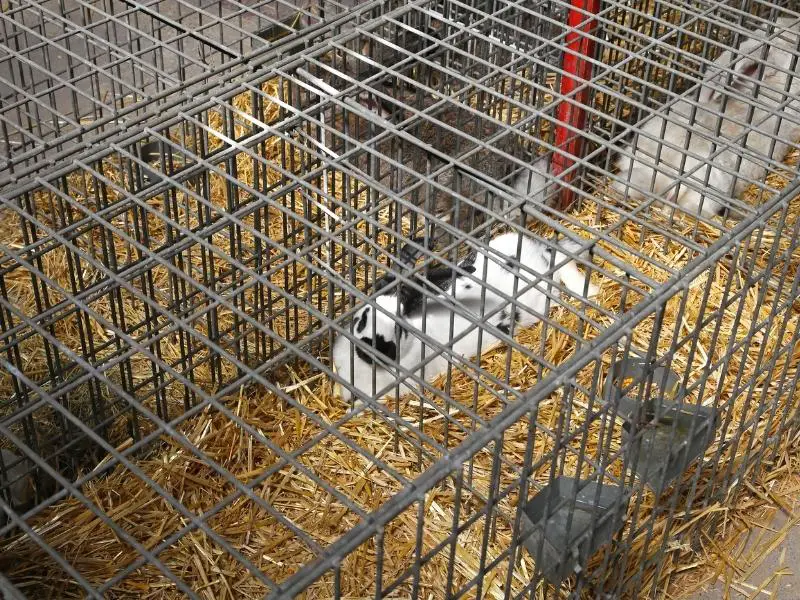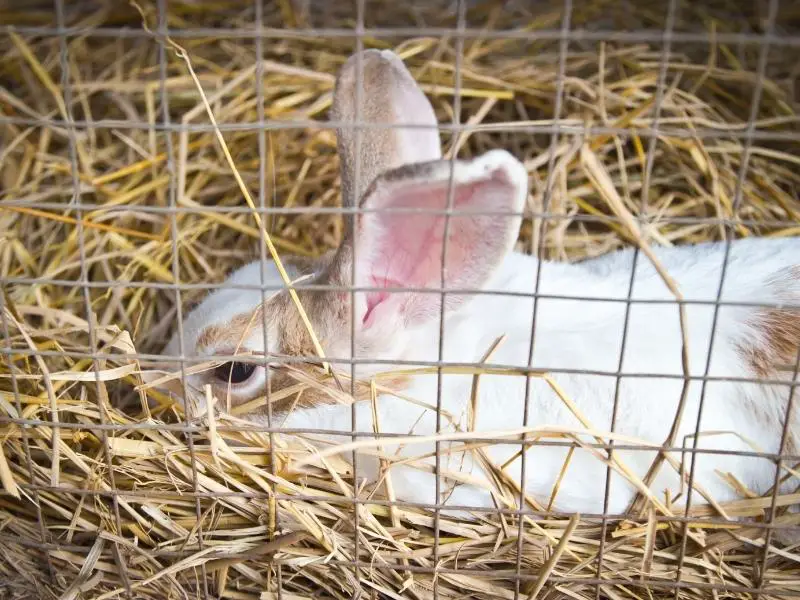There are many rabbit owners who don’t even want to hear the words “rabbit cage floor wire” because the wire can cause sore hocks or calluses on your bun’s feet, as they are uncomfortable. But a wire cage is easy to clean (if your rabbit isn’t litter trained) and helps with ventilation.
So if you opt for a wire rabbit cage, what size wire should you consider for the floor?
Consider a 14 gauge or 16 gauge double galvanized wire for the best rabbit cage floor, and go for wire gaps between half an inch to one inch big. This will ensure the cage is corrosion-resistant and strong enough to hold your rabbit, while the small gaps will prevent predators from entering the cage.
Ready to learn more about rabbit cage flooring and what tools you need if you want to DIY a rabbit cage? You’re in luck because we have all the info you need.
Different Sizes That Could Work for Your Rabbit Cage Floor
There are various wire sizes that could work well for your rabbit cage floor.
One important aspect to remember is that the gauge of a wire refers to the wire’s thickness. A higher wire gauge is a thinner wire compared to a lower wire gauge which equals a thicker wire.
So a 16-gauge wire is thinner than a 12-gauge wire, for example. And if you go for a 20-gauge wire, then it’s likely that your bun will chew through the wire.
Here are the wire sizes you can consider for the floor of your rabbit cage:
16 Gauge
The standard wire size for small animals – so dwarf and small breed rabbits – is a 19-gauge wire. However, a thicker wire at 16 gauge provides more protection.
If you are worried that your bun will chew through a 16 gauge, know that while a rabbit can potentially chew through this wire size, it will take a while.
14 Gauge
A 14-gauge wire is the most common wire size for rabbit cages that house medium or large rabbit breeds.
12 Gauge
A 12-gauge wire would work well with large and giant rabbit breeds because the wire is thicker, and therefore, stronger.
A 12 gauge wire can also be spot welded to attach the parts of the cage. This makes constructing a larger size cage much easier.
Things You Need to Build a Wire Rabbit Cage

There are various tools you need to build a wire rabbit cage (that is if you don’t want to go the easy route and order one online):
- A rabbit cage plan so you know how much material you will need, how big the rabbit wire cage is, and what the finished product will look like
- Measuring tape
- Wire cutters or tin snips
- Hammer
- Wire mesh (for the floor, sides, roof, and door)
- C-rings or J-clips (or small and large hen cage clips)
- C-ring or J-clip pliers
- Latch or dog-leash snap fastener (for the cage door)
- Wooden hutch frame
- Nails or staples (to secure the wire cage to the wooden frame)
Things to Consider When Building a Wire Rabbit Cage
Don’t simply opt for the cheapest or discounted wire rabbit cage at your local pet store.
Instead, ask questions, consider all aspects of the cage, and think like a rabbit. This is how you will choose the perfect wire size for your rabbit cage.
Rabbit Size
For lighter size rabbits, you can opt for a finer quality wire mesh for the cage floor. Since the rabbit weighs less, they won’t cut their feet on the wire mesh as easily as a heavier rabbit would.
The size of the rabbit would also influence the size of the openings in the wire mesh. The smaller the rabbit’s foot size, the smaller the openings should be to prevent the rabbit’s foot from slipping through.
Rabbit Breed
Some breeds of rabbits have more delicate foot structures. These rabbits may also have delicate feet or large hocks that are easily damaged in a wire mesh floor cage.
Wire Gap Size
You should also take the wire gap size into consideration when building your rabbit wire cage.
If the gaps are too big, then a rabbit predator like a snake can easily make its way inside and eat your bun.
Also, if the wire gaps are too big, it’s easy for your rabbit to get a foot or leg into the gap, and once their limb gets caught, they can break a leg.
Your rabbit may also panic when it feels stuck and trapped, and the stress can cause a heart attack, which may be fatal.
Ideally, go for a wire gap size that has 1-inch squares, or for added security, opt for a wire gap size of 1 inch by ½ inch.
These gap sizes are also perfect for the rabbit droppings to drop through, ensuring the rabbit cage stays clean.
Wire Finish
Rabbit urine has a high ammonia content, and over time, it causes wire mesh that isn’t PVC-coated, epoxy-coated, or galvanized to corrode.
A galvanized after welded (GAW) finish on the wire ensures the wires of the rabbit cage won’t corrode. Moreover, wire mesh that has a GAW finish is stronger and more durable.
Rabbit Wire Cage Location
Generally, the purpose of wire rabbit cages is to house outdoor rabbits since indoor rabbits don’t need wire flooring.
Depending on where the cage is positioned, you may need a thicker wire to ensure your rabbits are safe at night and protected from predators burrowing in from underground to eat them.
A thicker wire gauge will also be much longer-lasting, especially when galvanized or double galvanized as this protects the wire from rust and damage.
My Last Bunny Thoughts
Be sure you choose a wire gauge that suits your rabbit’s feet. The openings in the wire mesh bottom are as important to your rabbit’s foot health as the actual thickness of the wires is.
Incorrect mesh size will lead to grazed and sore footpads, while hocks may rub raw as a result of the cage being too small.

